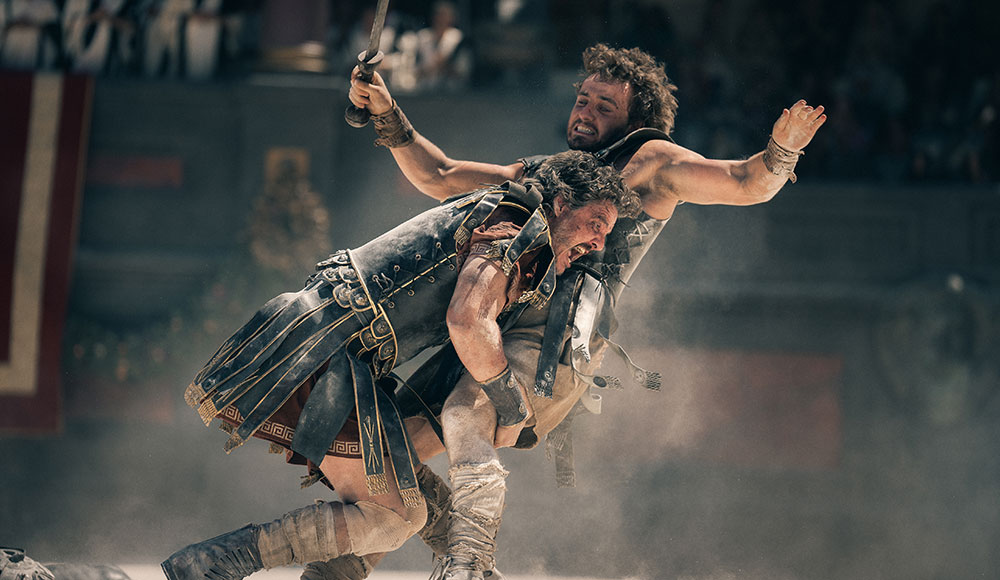Re: Ridley Scott’s Gladiator II, the sequel to his Gladiator (2000): What would the world do without gladiator movies? (The ones set in the ancient Roman Empire, of course, preferably in the vast and menacing Colosseum.)
Where else would audiences get their regular dose of metaphorical decadence, cruelty and bloodshed, from the bad old days before killer drones and social media?
To help prospective audiences sort through the swords and sandals, here’s a handy overview of some noteworthy gladiator pics, the gaudier the better:
Old-fashioned filmmakers understood that if they wanted to get away with murder, perversion and other naughty ancient pastimes, they needed to present them in a suitably religious wrapper to placate the censors.
The sorrowful plight of persecuted Christians dying in the Colosseum fit the bill nicely for director Cecil B. DeMille, whose The Sign of the Cross (1932) featured singing martyrs being torn apart by lions, sexy Claudette Colbert as Empress Poppaea and the perfervid hamming of Charles Laughton as mad Emperor Nero.
Mervyn LeRoy and Anthony Mann’s Quo Vadis (1951) upped the ante in all categories. Actor Peter Ustinov’s Nero has never been surpassed for inspired fruity insanity, and the requisite conscientious objector role of court satirist Gaius Petronius Arbiter, author of the Satyricon, is ably handled by British thespian Leo Genn. That Technicolor blood is RED.
Spartacus (1960), the epic story of the rebellious slave/gladiator whose name later became a rallying cry for social revolutionaries, was a major career highlight for both actor Kirk Douglas and director Stanley Kubrick. The presence of tough guys Woody Strode and Charles McGraw at the gladiator academy set the violent parameters for every “savage Roman Empire” movie that followed, including Gladiator II.
For drive-in-style thrills and laffs, the 1973 Roger Corman production The Arena opened up new avenues of cheap sadism, as captured barbarian female warriors Pam Grier (a Nubian princess) and Margaret Markov (a Gallic amazon) take on all comers in the title venue.
The joyous absurdity of movies like this naturally led to jokes from the Monty Python troupe. Their Life of Brian (1979) ramps up the iconoclastic irony, and the mayhem, with scenes of gladiatorial combat (“Children’s Matinee” at the Jerusalem Colosseum) and the funniest mass crucifixion ever staged. It’s directed by the Pythons’ Terry Jones, who also plays the Virgin Mandy.
And then there’s Barabbas (1961), with Anthony Quinn as the law-breaking would-be-martyr whose place on the cross was taken by a certain rabble-rousing carpenter from Nazareth—directed by Richard Fleischer. Or 1954’s Demetrius and the Gladiators, starring Victor Mature as yet another doomed slave/combatant with a guilty Christian itch that needs scratching.
Throughout motion picture history, moviemakers looking for a way to get sweaty swordplay and religious platitudes on the same super-duper screen—plus a little sex—went to the Romans-versus-Christians spectacle well repeatedly.
Scott’s Gladiator II follows the blueprint faithfully. Fearsome captured fighter Lucius (Paul Mescal), son of the late Maximus (Russell Crowe, from the previous installment), also happens to be the long-lost grandson of the noble emperor Marcus Aurelius. So he’s not just some ignorant prole. Lucius’ gory exploits in the Colosseum naturally gratify his mother Lucilla (Connie Nielsen, one of the film’s best performances), but not so much the unscrupulous gladiator dealer Macrinus (Denzel Washington, also in fine form).
The “twin emperors” Geta (Joseph Quinn) and Caracalla (Fred Hechinger), a pair of pallid, effete boobies, mince around the palace while gladiators are disemboweled and party guests are served a buffet from the head of a rhinoceros. Sample dialogue: “This city is diseased.”
Filmmaker Scott’s visuals are as sumptuous (and obviously expensive) as usual, but this is plainly a rehash of familiar material, garnished with nonstop brutal action and a certifiable hint that the Roman populace is fed up with bread and circuses presented by utterly corrupt rulers. Maybe that applies to the rest of us as well.
Now playing at CineLux theaters in Capitola, Scotts Valley and Watsonville; Landmark’s Del Mar Theater; and Santa Cruz Cinema.












